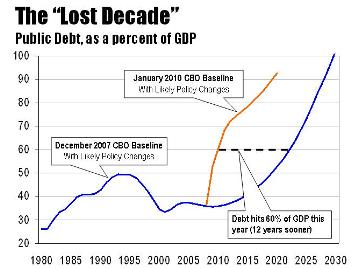Sometime prior to the 4th Century BCE, the Greeks invented democracy. They were a model for the world.
Unfortunately, I think the Greeks are well on their way to being a model for the world again. In their inability to plan for the future, their incompetence in delivering basic government services (like tax collection and land registry), and their lack of courage in confronting established interests, they are providing a brutal foreshadowing of the fate of other poorly-managed European countries. Right now the Greek news is on the front page, and the US’s problems are on page 4. Without dramatic reform, however, the US is just 1-4 years away from very significant challenges.
That’s why I ask you to lend your name to a statement of “Six Standards for the Joint Select Committee on Deficit Reduction” (a.k.a. “Super Committee”) that the nonpartisan Committee for Economic Development (CED) announced on October 4. Many leading CEOs have already signed.
Since 1942, the CED has played pivotal roles in rallying the business community around sound public policy at crucial moments in our nation’s economic history. They announced these standards due to deep concerns that, without the encouragement of the business community, the Super Committee’s efforts will not result in a deficit reduction plan that stabilizes the federal budget. They will fail, just like prior committees have failed.
After CED met with the White House and Members of Congress from both political parties, it became clear that there is an urgent need for business to speak publicly on the debt crisis. Senator Mark Warner – one of the leaders of the bipartisan “Gang of Six” that tried to put together a deficit reduction plan earlier this year – has specifically asked that the business community actively support the Committee’s efforts so that a significant deficit reduction effort has a real chance of being enacted before the end of 2011.
The CED is taking Senator Warner’s challenge very seriously. The six very strong standards they developed are already being applauded. For example, Erskine Bowles, one of the co-chairs of the Bowles-Simpson Commission, eagerly agreed to be listed as a supporter for the standards.
I’m making a very simple request: Please join CED in lending your name to our statement of six standards that will hold the super committee accountable to reducing the public debt and make it more likely it will succeed. These standards represent CED’s most crucial points for stabilizing the deficit and federal debt and reflect years of research on the subject.
If keeping the US healthy is important to you, you can help by circulating this to your colleagues in the business community. We need to build the broadest possible support to make this effort effective.
If it is to succeed, the Committee must meet or exceed the following six standards established by the Committee for Economic Development:
First, the Committee must reach well beyond its enabling law’s minimal goal of $1.2 trillion of deficit reduction (in addition to the $900 billion in savings already enacted). At least $4 trillion in total savings is needed merely to begin to stabilize the nation’s debt burden, and the financial markets and the ratings agencies could well react adversely to a smaller agreement (or no agreement at all). The potential elements of such an agreement are well known; only political will and action are missing.
Second, Medicare and Social Security, the age-driven entitlement programs, must be made sustainable for the long term. Medicare is the largest contributor to the projected long-term explosion of public debt, and is driven by the same complex healthcare cost inflation that tears at household budgets and business job creation. Reforming these programs requires sensitivity to the needs of current retirees, and of future retirees with modest incomes.
Third, the agreement must include additional tax revenue. There simply is not enough achievable deficit reduction on the spending side of the budget. Both fairness and competitiveness in world markets will require fundamental tax reform to eliminate outdated and ineffective tax exclusions, deductions and credits, so that tax rates can go down while tax revenue goes up.
Fourth, the Committee must achieve substantial savings from non-Medicare, non-Social Security spending – defense and domestic – even though it is not the source of the long-term budget problem. The public debt already is too large and growing too rapidly. Medicare and Social Security reform cannot achieve budget savings soon enough – partly because they must protect current retirees, and also because the needed transformation of the healthcare system will take time.
Fifth, the struggling economic recovery needs a boost. The Committee must respond, but must keep this effort simple and clean. A one-part program would be best. The numerous slow-moving appropriations provisions weighed down the 2009 stimulus bill and limited its success. [Note from David Teten: one comparison of a typical US airport, e.g., Newark, with most European/Asian airports will make it clear how much infrastructure work we need. This is an obvious area where we can put unemployed construction industry professionals to work.]
And finally, the Committee must elicit genuine bipartisan commitment. Solving the debt problem will require years of effort. Appropriations are enacted one year at a time, and so long-term savings will require restraint in future years by future Congresses – which this Congress cannot bind. The Committee’s short lifespan probably does not allow enough time to write detailed legislation for fundamental tax and healthcare reform. Future Congresses could derail needed future deficit reduction, or even repeal actual legislation enacted this year. So this budget agreement must be built upon solid bipartisan commitment that can withstand political challenge not just this year but for years to come.
Please let me know if you can join me and CED in this important public policy effort.
– Please tweet this with #SaveUS.
– To add your name to the petition that will be delivered to the President and other people in a position to save us from ourselves, register on the CED site.
Save the US from becoming Greece.
Image credit: CED, Sean Hackbarth

